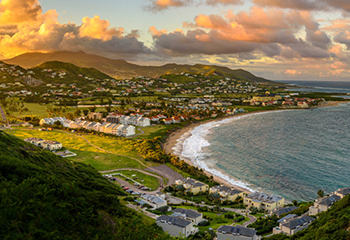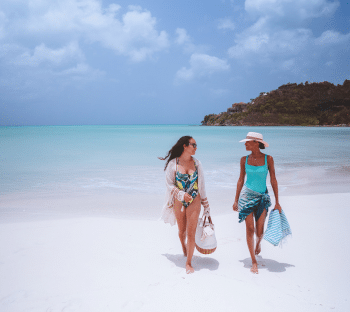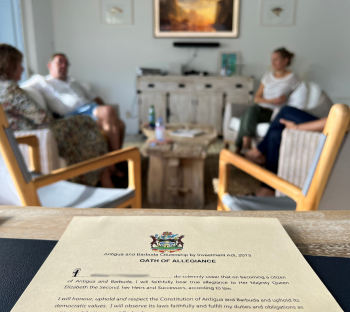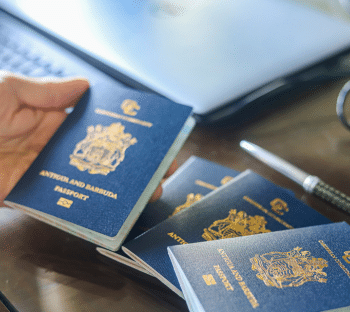When planning your future, it is important to compare programs to determine which one is best for you. We wanted to help you out with your choice by creating a quick comparison of the five Caribbean Citizenship Programs that we offer at Citizens International.
First of all, who wouldn’t want a second home in the Caribbean? Antigua and Barbuda, Dominica, Grenada, St. Kitts and Nevis and St. Lucia all have something special to offer. The beautiful beaches, amazing lush and tropical sceneries, captivating culture and delicious food should already reel you into your decision of second citizenship.
Before getting into what sets each island apart, let’s point out some similarities. Once you have been approved for citizenship, your citizenship is for a lifetime, meaning it is irrevocable. Citizenship from neutral Commonwealth Countries applies to each island. There are no residence requirements for Dominica, Grenada, St. Kitts and Nevis or St. Lucia. Whereas, Antigua and Barbuda require a one-time 5-day visit in the first five years of citizenship. Each island has extended their definition of ‘Dependents’. They are now allowing children up to 30 years of age, parents and grandparents above the age of 55 (or in Grenada’s case parents above the age of 55 and grandparents above the age of 65), and unmarried siblings to be added to an application. If that isn’t a game-changer, this certainly is, once an application has been approved dependents are now allowed to be added after. This includes a future spouse, dependent children, a future spouse of dependent children, future children of dependent children and unmarried siblings!
Now, let’s get to the real facts that set each island apart:
Let’s Talk Taxation! Antigua and Barbuda and St. Kitts and Nevis require zero annual tax filings, income tax, capital gain tax, wealth/net worth tax, and gift/inheritance tax. Whereas for Dominica and Grenada, annual tax filings are mandatory. Income tax is required for both islands. For Dominica, residents are taxed on their worldwide income and for Grenada, residents are taxed on their income generated in Grenada. Non-residents are taxed only on income sourced on the island on which they reside (this applies to Dominica and Grenada). St. Lucia on the other hand requires income tax, residents pay 30% and non-residents don’t have to pay anything. St Kitts recently changed their rules so that ANY property over USD $400,000 now qualifies the buyer to make a citizenship application i.e you’re not restricted to only the ‘approved developments’.
Antigua and Barbuda is the most cost-effective for a family. Whereas Dominica is the cheapest for a single applicant. Grenada is the most costly, however, the difference between it and the other passports is the fact that you can apply for a USA E2 Visa if you obtain Grenadian citizenship. This attracts some people but it should be noted that the E2 is a temporary residency visa that allows you to invest in and work in your own company in the US. It is renewable every few years and is only valid as long as your business is a going concern. It allows your spouse to obtain a work permit (whilst your E2 is valid) and kids up to 18. It does not lead to a green card – this is a misunderstanding! You can also enter China visa-free with a Grenada passport so for anyone doing business there, that is a bonus.
The process for citizenship take 4-6 months in Antigua & Barbuda, whilst Dominica takes 3-4 months. Both Grenada and St. Lucia’s process for citizenship takes 3-6 months and St. Kitts and Nevis 4-6 months, however, an accelerated process in 60 days is allowed for an additional cost.
See below for each Nationality Restriction:
Antigua and Barbuda:
Afghanistan, Iran, North Korea, Somalia, Sudan, Yemen*
*Unless resident for more than 10 years in another country and maintain no economic ties to any restricted country
Dominica:
Iran*, North Korea*, and Sudan*
*Unless resident for more than 10 years in another country, have no substantial assets there, and are not performing and have no performed any business or similar activity, in whole or in part, in or with these countries
Grenada:
There are no specific country restrictions, but cases decided on an individual basis – do keep in mind that Grenada can automatically reject applicants refused by other countries
St. Kitts and Nevis:
Afghanistan, Cuba, Iran, North Korea
These nationals cannot apply for SKN citizenship regardless of where they live
St. Lucia:
Iran
In some cases, if you are on the restriction list and you have been living outside of that country for more than ten years you may be able to apply for citizenship in the Caribbean.
This could be the next chapter of your life. Why wait to make the life you want a reality? Security, good education, great health care, and a safe haven for you and your family is what a second passport in the Caribbean can provide you, should you decide to move here in the future. Simply having that option for yourself and your family throughout your lives provides huge peace of mind in an increasingly uncertain world.
We hope that this mini-guide comparing the programs has helped you with your personal pro’s and con’s list when it comes to choosing a second home. Let us help you plan your future filled with relaxation, adventure, security and nonstop good vibes in the Caribbean. You can view more details on each island by downloading this pdf guide CI Caribbean Comparison Download.
How do I begin the process and get a bespoke quote for myself and my family?
If you’d like to speak to us, please either send us a webchat (click the icon bottom right of this page), email or book in for a video consultation easily in our partner calendar. We find video conferencing to be the most efficient use of your time to ascertain the best program for you and your family. We encourage you to take advantage of it since your first consultation is free of charge.



